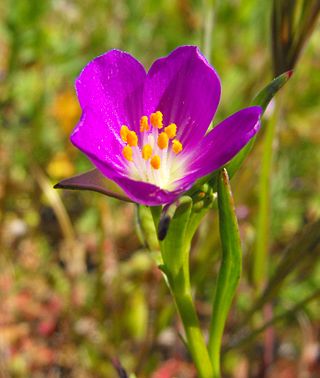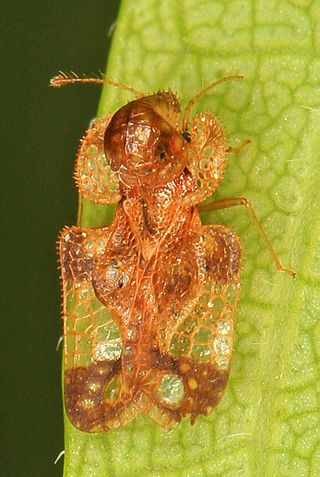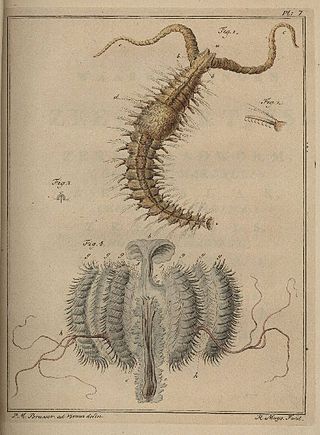
Toona, commonly known as red cedar, toon or toona, tooni is a genus in the mahogany family, Meliaceae, native from Afghanistan south to India, and east to North Korea, Papua New Guinea and eastern Australia. In older texts, the genus was often incorporated within a wider circumscription of the related genus Cedrela, but that genus is now restricted to species from the Americas.

Toona ciliata is a forest tree in the mahogany family which grows throughout South Asia from Afghanistan to Papua New Guinea and Australia.

The Tingidae are a family of very small insects in the order Hemiptera that are commonly referred to as lace bugs. This group is distributed worldwide with about 2,000 described species.

Calandrinia ciliata is a species of flowering plant known as fringed redmaids and red-maids. While formerly included in the Purslane family, it is now treated as a member of the family Montiaceae.

Pseudosquilla ciliata, the common mantis shrimp, is a species of mantis shrimp, known by common names including rainbow mantis shrimp and false mantis shrimp. It is widespread in the tropical Indo-Pacific region and in both the western and eastern Atlantic Ocean.

Corythucha is a large genus of lace bug in the family Tingidae that is primarily distributed in the northern hemisphere, including Europe, North America and eastern Asia. The genus includes pest species such as the “cotton or bean lace bug" as well as species that provide maternal care, such as C. hewitti (Drake)

Corythucha ciliata, the sycamore lace bug, is a species of lace bug in the family Tingidae that is associated with sycamore trees. It's also known as the plane lace bug due to its association with the London plane.

Grindelia ciliata is a species of flowering plant in the family Asteraceae known by the common names Spanish gold, goldenweed, and waxed goldenweed.

Populus ciliata, the Himalayan poplar, is a large deciduous tree with tall clean straight trunk and wide rounded crown. The bark of the young trees is smooth and greenish-grey while the bark of the old trees is dark brown with vertical cracks. Leaves are broadly ovate with hairy serrulate-crenate margins. Flowers are drooping raceme catkins that appear before or with leaves. Populus ciliata flowers are dioecious. Male flowers have a bell-shaped perianth and female flowers are bluntly toothed. A single capsule encloses an average of 100–150 seeds, which are covered by long silky hair.
Edenville Dam was an earthen embankment dam at the confluence of the Tittabawassee River and the Tobacco River in Mid Michigan, United States, forming Wixom Lake. The dam was about one mile (1.6 km) north of Edenville, mostly in the southeast corner of Tobacco Township in Gladwin County, with its southeastern end reaching into Edenville Township in Midland County. Its height was 54 feet (16 m), the length was 6,600 feet (2,000 m) at its crest.

iNaturalist is an American 501(c)(3) nonprofit social network of naturalists, citizen scientists, and biologists built on the concept of mapping and sharing observations of biodiversity across the globe. iNaturalist may be accessed via its website or from its mobile applications. iNaturalist includes an automated species identification tool, and users further assist each other in identifying organisms from photographs and even sound recordings. As of 9 July 2024, iNaturalist users had contributed approximately 197,660,888 observations of plants, animals, fungi, and other organisms worldwide, and 290,007 users were active in the previous 30 days.

Polydora ciliata is a species of annelid worm in the family Spionidae, commonly known as a bristleworm. It is a burrowing worm and is found in the northeastern Atlantic Ocean and some other parts of the world.

Madeleine Egle is an Austrian luger. She won bronze at the 2016 Winter Youth Olympics and in 2018 another bronze medal at the 2018 Olympics in Pyeongchang.

Clusia is a genus of flies in the family Clusiidae. There are about 12 described species in Clusia.
Wixom Lake was a reservoir in the U.S. state of Michigan from 1925 to 2020. It was named after Frank Wixom, who was instrumental in building the Edenville Dam. Unusual for its size, Wixom Lake boasts a lighthouse on Musselman Island. From 2019 to 2020, an agreement to buy the dam and reservoir by the Four Lakes Task Force, a "county-delegated authority" under the State of Michigan, from Boyce Hydro L.L.C. was in place, However, in May 2020, the lake was destroyed when part of the earthen dam used to impound it collapsed. From 2018 to 2020, the impoundment was regulated by the Michigan Department of Environment, Great Lakes, and Energy (EGLE).

Egle is a genus of willow catkin flies in the family Anthomyiidae. There are at least 40 described species in Egle.

Ciliata septentrionalis is a species of fish belonging to the family Lotidae.
Bicellariella ciliata is a species of bryozoan belonging to the family Bugulidae. It is found in shallow water on both sides of the Atlantic Ocean, the Mediterranean Sea and the Indo-Pacific region.

Hippocrepis ciliata is a species of annual herb in the family Fabaceae. They have a self-supporting growth form and compound, broad leaves and dry fruit. Individuals can grow to 17 cm tall.

Vulpia ciliata is a species of plant in the family Poaceae.


















